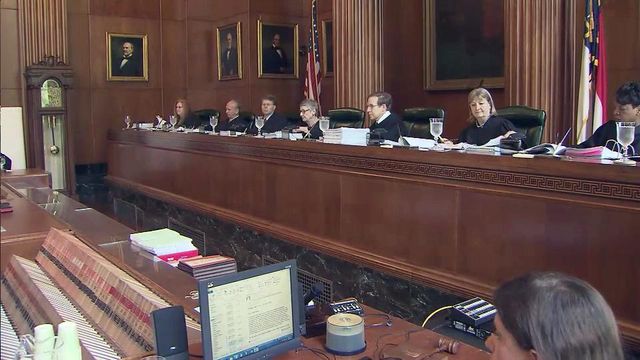Repealed bias law lives on in NC challenge to overturned death sentences
Months after Republican lawmakers repealed the Racial Justice Act, the controversial law resurfaced at the North Carolina Supreme Court on Monday, with lawyers for the state arguing that death sentences should be reinstated against four inmates who sought relief under the law.
Posted — UpdatedThe 2009 law allowed death-row inmates to use statistics, among other evidence, to show that race-based decisions played a role in the choices made by prosecutors or other court officials, ultimately leading to their death sentences. The General Assembly scaled back the law in 2012, limiting the scope of the statistics allowed, before eliminating it entirely last year.
More than 150 inmates have filed motions for relief under the Racial Justice Act.
The Supreme Court heard two cases involving the act: One that was heard under the initial law and one that was heard under the revised statute.
Marcus Robinson, who was convicted for the 1991 shooting death of a 17-year-old, was the first inmate whose sentence was commuted to life without parole under the Racial Justice Act.
Special Deputy Attorney General Danielle Elder said Robinson never showed any discrimination in his case, relying solely on statistics pulled from other trials to argue for a life sentence. Elder said lawmakers never intended for "the absurd result" of specific inmates benefiting from bias shown elsewhere but not against them.
Elder also argued that Superior Court Judge Gregory Weeks abused his discretion by refusing to hear from the trial judges in some of the cases cited in the bias claim, instead making the determination himself based solely on reading trial transcripts.
Donald Beskind, a lawyer for Robinson, said, however, that 50 percent of blacks in Robinson's jury pool were disqualified, compared with only 14 percent of whites in the pool. He said Cumberland County prosecutors showed a consistent pattern of striking potential black jurors.
The Racial Justice Act didn't state that discrimination had to be intentional, Beskind said.
"The harm to be prevented is not just intentional decisions. It is race-based decision-making," he said.
Elder said there are plenty of non-racial reasons for keeping people off juries – among them, having reservations about imposing the death penalty or having relatives or friends with criminal histories.
She said that, in the second case before the Supreme Court, that Weeks wrongly took the findings of discrimination from Robinson's case and applied them to the claims of three other inmates to determine that bias was present before any evidence was even presented.
Jay Ferguson, an attorney for Quintel Augustine, Tilmon Golphin, and Christina Walters, said race was "the driving force" in Cumberland County prosecutors' decisions to find juries to obtain convictions and death sentences.
Augustine was convicted of killing a Fayetteville police officer in 2001. Golphin and his brother were found guilty of gunning down a State Highway Patrol trooper and a Cumberland County deputy during a two-state crime spree. Walters was the leader of a Fayetteville street gang convicted of killing two women and shooting another during an initiation ritual in 1998.
Ferguson cited prosecutor notes during the trials that show black and white jurors "are viewed through a different lens."
It's unclear whether the Supreme Court's decisions will be narrowly tailored to address issues specific to these cases or will be broad enough to guide future appeals under the Racial Justice Act.
Related Topics
• Credits
Copyright 2024 by Capitol Broadcasting Company. All rights reserved. This material may not be published, broadcast, rewritten or redistributed.






